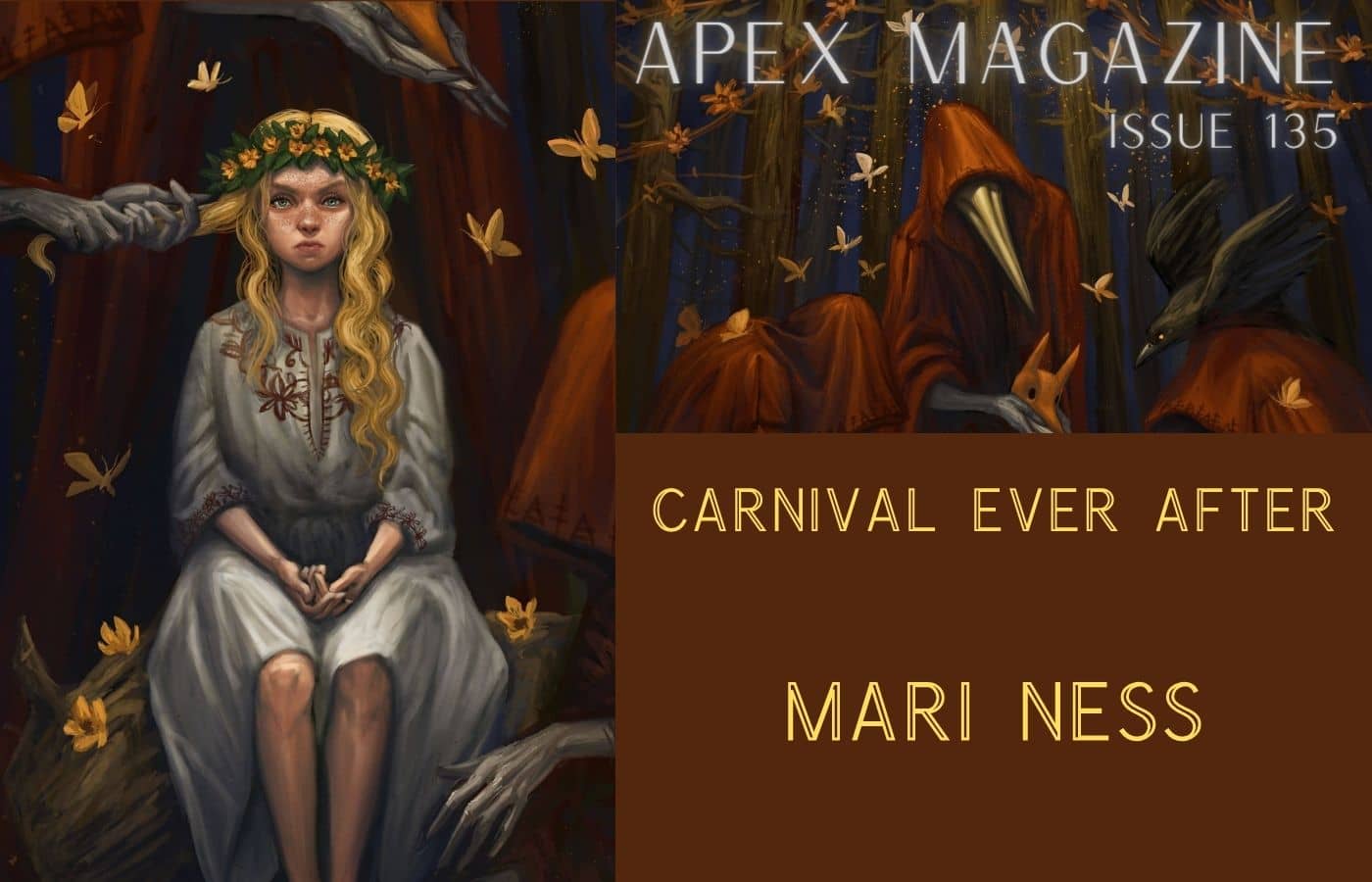
Just six private showings this evening. Six.
She pressed her lips together.
Perhaps shifting to these smaller performances had not been the best idea. True, her more public performances had sometimes ended in near riots and mayhem and injury, the purported reason why Miguel had insisted that she leave their grand stage for a private tent. They had to think, he said piously, of the safety of their patrons, pretending not to hear Valya snorting behind him. But the real reason, of course, as with everything with Miguel, was money. By permitting her to appear only at exclusive events, he could charge more. Considerably more. And naturally—another snort from Valya—he would share the additional profits with her.
It had all sounded reasonable enough, and she had privately welcomed the break from the crowds and the terror and horror and, far worse, pity in their eyes. That remained in the private showings, of course. But at least she faced fewer eyes. But the additional coin had never manifested. Not that she trusted Miguel—no one did—but she did trust Sophie, and Sophie frequently worked the ticket booth.
Sophie could, of course, be deliberately underselling those private showings, to spare—
But no. Sophie spoke too often of a little cottage close to the sea, with a vegetable and flower garden. A cottage and garden that could be obtained only by coin.
Still. Perhaps she should speak to Sophie tonight.
She took a deep breath before rapping the table beside her, her signal to Karl to let the last group in. Yes, she would talk to Sophie, the second she removed this corset and the tight boots and the gloves and—
Her last patron stepped forward into the lantern light.
“You,” she hissed.
A snake fell to the floor.
She allowed him to take her to a nearby tavern. Ordinarily, she disliked leaving the carnival, and disliked public taverns even more, but the heavy tent cloth would barely even muffle the sounds of their conversation, and she could not, would not, take him into any of the caravans. No. However unsafe, the tavern was still a better option.
If still not a particularly private one. Twenty guards trailed him, and Karl and Francesca trailed the guards, Karl holding, not casually, the heavy staff he sometimes used against the carnival’s more riotous patrons, and Francesca playing with two daggers that she had sharpened earlier that day. Karl, at least, would—should—have the sense not to interfere. Francesca—
Well. Perhaps Karl would restrain her.
Not something she could worry about now. And besides, temper or not, Francesca was—
… less complicated than Sophie. Yes. That was a good phrase. Less complicated.
Something else she couldn’t let herself think about now. Not with the man sitting across from her.
the silver pitcher so heavy in her hands
She allowed him to order for both of them—strong red wines, some sort of meat and fruit pastries, hardly what he was used to, she supposed, but he did not complain. Karl and Francesca remained just outside, but his guards did not, quietly and efficiently dispersing themselves throughout the room of the tavern, taking seats swiftly vacated by other patrons. She shut her eyes for a second. The carnival was only welcome if—if—it did not disrupt local business, and this was certainly a disruption. A disruption that was hardly the fault of the carnival, but would the tavern agree?
A problem for Miguel in the morning.
“So,” he said. “A carnival.”
That did not need an answer.
“I was—we were—astonished when we heard.”
This too did not require an answer.
“You could have come to us.”
That required a long sip of wine.
“You could have,” he repeated.
She arched one eyebrow.
“I asked her to come,” he said. “But.”
So much in that word, but.
After a moment, he continued. “She does not care to leave the palace, and could not be certain. For all we knew, the tales were of someone else—”
She allowed the other eyebrow to rise.
“An imitator, perhaps. Or another … visitor to that well. In any case, she did not want to come here and be disappointed.”
the smiling woman on the edge of the well
The food, half-swallowed, seemed to stick in her throat.
“She does miss you,” he said.
She could not help the slight snort.
“Truly. She does.”
Hardly more believable.
He leaned forward. “I’m not claiming any lingering childhood fondness. Just that you were —you are—the only other one who saw. The only one who remembers.”
A chill.
“The only one who knows the truth.”
sharp teeth between lips as red as roses
“Yes,” she said quietly.
He flinched as the toad started to hop across the table.
She was accustomed to choosing her words carefully, to saying nothing that was not necessary. To saying nothing when she was inside a building unless she had ample coin, and even then.
She leaned forward. “Is that why you are here? For the truth?”
On the edge of her vision, she could see the guards flinch.
“Because the truth was, all my mother could see was the gems.”
Small snakes. Red snakes. Blue snakes. Black snakes. The guards were standing up now, swords out, eyes darting about. She took a long sip of red wine.
“It was all you could see as well.”
His turn to take a long sip of wine, and flinch to see the snake dangling from his goblet.
“I came to see if you were well.”
She picked up one of the smaller snakes and began to stroke it.
“Your sister—”
“Your wife.”
A toad in her pastry.
“I—we—wondered about you. So when we heard of the tales of the carnival—”
“She rushed here, kindly as always.”
And now snakes in her pastry.
“Unfair.” His tongue flickered over his lips. “She is not well. The pearls are manageable, and some of the other gems, but the rubies and the diamonds … Well. You saw, before you left.”
She had seen. She still sometimes woke up from a deep sleep, screaming, because she had seen. The cuts on her sister’s lips, narrow at first, with no more than a drop or two of blood, but growing deeper and deeper with each word. The rose thorns that had scratched her chin.
Toads and snakes were softer on the lips and teeth.
“She finds eating nearly impossible now. We—” his hands clenched— “mostly feed her on soup. I haven’t heard her voice in three years. Neither have our children.”
Her sister had loved to sing, once.
Go and draw water from the well.
She only wished she had been crueler to the old woman that day.
No, not a woman. Whatever she had been, it had not been mortal. Not human.
“But it is not all ill,” he added with a forced smile. “Now that we have found you, and you can return to your proper place at your sister’s side.”
the fine ladies and gentlemen, dripping in silk and jewels, the snakes sliding from her mouth
“No,” she said sharply.
The snake that emerged from her mouth was larger than the others, and moved slowly, sliding down her neck and chest towards the table, tongue flickering.
“But—”
“No.”
“The queen’s sister cannot live—”
“With peasants? With freaks?”
Well. She was not that hungry, anyway. At least the toads would enjoy the pastry.
“You have a place. A station. Responsibilities. How do you think it looks—”
“That is correct,” she told him. “Responsibilities. To the carnival. To the place that welcomed me.”
“I am welcoming you now.”
“Because you do not want people to know that I prefer a carnival to your castle.”
He briefly shut his eyes.
“Because you should come home.”
“I am home,” she said.
He stared down into his goblet.
She studied his face.
He had never been handsome. Even they, in their remote village, had seen better-looking men. But he had once, she remembered, been charming. Even to her, the sister banished to the corner with her toads and snakes.
Even to her, the sister who had once refused to be kind to a stranger, and draw water from a well.
skin bruised as blue as sapphires
The sister who had refused to be charming.
And now …
The pastry was ruined, and she did not want any more wine. Not there, anyway, not in front of him. And she could not keep Karl and Francesca waiting outside. She stood up. She should say, she thought, something charming. Something courtly. A few more toads and snakes would hardly matter now.
But she could think of nothing to say.
She stepped towards the doorway.
“Wait,” the king said, so softly that she was probably the only one to hear.
Her mouth felt full of snakes. She turned.
He pushed two silk bags towards her, each just large enough to fit in the palm of her hand. She picked up one, weighing it.
Not difficult to guess the contents, or their source.
the shining sun, the cold well, the dark and quiet wood
“I write,” she told him. “With a slate and some chalk. And sign.”
His eyes narrowed.
“Like this,” she said, spelling out diamonds, then blood, then sister on her fingers.
He nodded.
“She might learn, in a carnival.”
She leaned forward and took both bags.
“Use cautiously,” he said. “As we discovered, spend too many at once, and they lose their value.”
She did not trust herself to speak. She nodded, sharply, and hurried out of the tavern, trying not to hear the soft hisses she left behind.
Karl and Francesca did not try to talk on the way back to the carnival, although Karl gave her a long, searching look, and Francesca a quick, warm hug. They knew something of what it was like to meet up again with people from before, if not everything.
And neither, she thought, were particularly fond of snakes. Or toads.
She tried to think of all the cities and towns the carnival had visited, of all the wonders she had seen. The music she had danced to. The splash of sea waves on sandy shores. The wooden bracelet Sophie had snapped around her wrist.
But all she could see, could think of, was her sister, sitting against a tower window, ropes of pearls around her neck.
Her small caravan had rarely looked so welcoming. And Sophie was already there, sewing busily away at the costumes that could even make a toad girl look striking and elegant in the lantern light.
Dearest Sophie, who would never be a king.
“A king, Valya said. Only after you had left, of course. You must be chilled straight through.” Sophie did not wait for an answer; they had been together too long for that. “I pulled out some of the better wine, the stuff we picked up back in Bavaria. And I stole some chocolate from Michel. He shouldn’t be eating it anyway.” Sophie took a deep breath. “I am sorry. More than sorry. If I’d known, I wouldn’t have sold him a ticket. I swear. And I should have known. Those clothes, the guards—”
A tear ran from Sophie’s kind brown eyes down to a neatly trimmed beard.
Reassurances should be easy. None of this—none—was Sophie’s fault. But that long-term habit of limiting her words to what was strictly necessary, locked her lips. She stared at the floor.
Sophie moved forward, placing warm hands on her shoulders. “If you need to, you can talk to me. Out loud, or not. It doesn’t matter. Or not talk. Or both. Just … you can. Please know that.”
“I know,” she answered, so quietly that she did not know if Sophie heard.
But the snakes did, sliding from her lips and rolling down her chin as she turned to Sophie, burrowing herself in the other woman’s arms. She would not think of her sister, or of that cold well in a distant wood. She would not. And yet, she could still taste the fresh water on her lips, still feel the snakes rising through her throat to drink.













